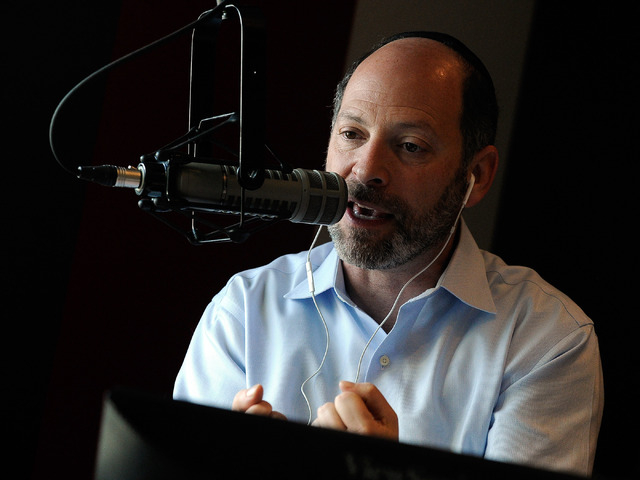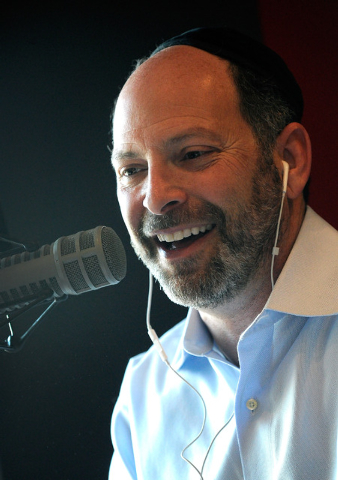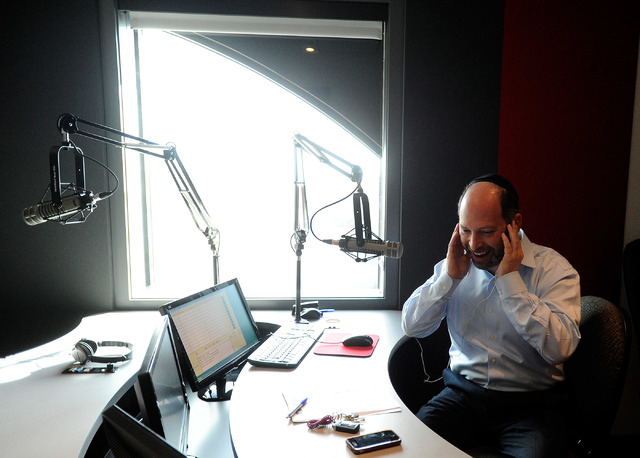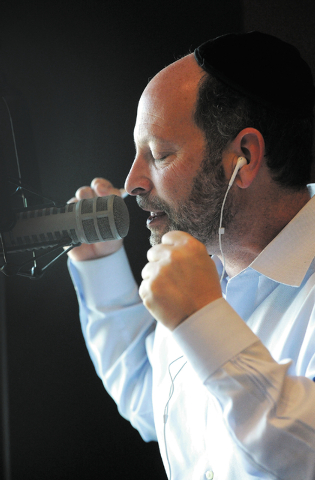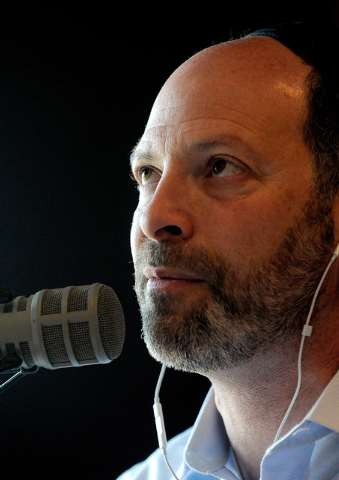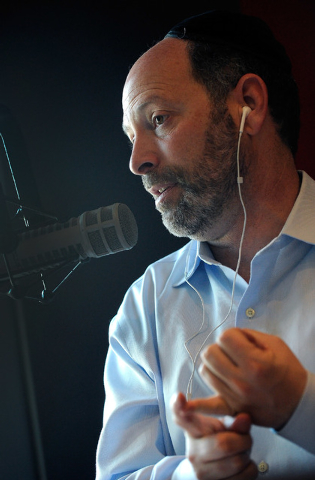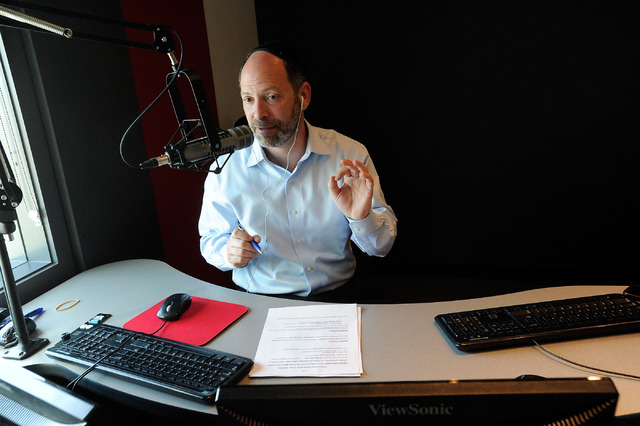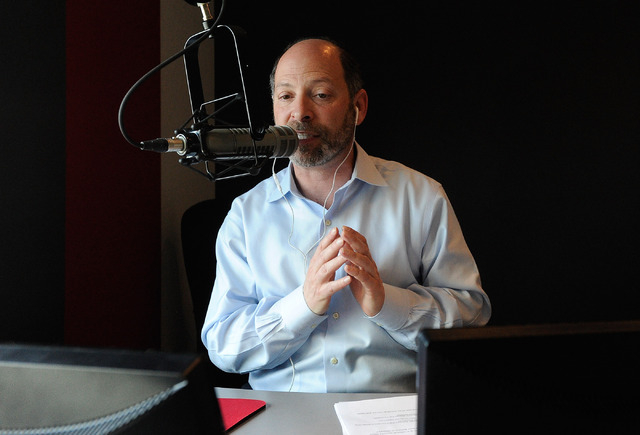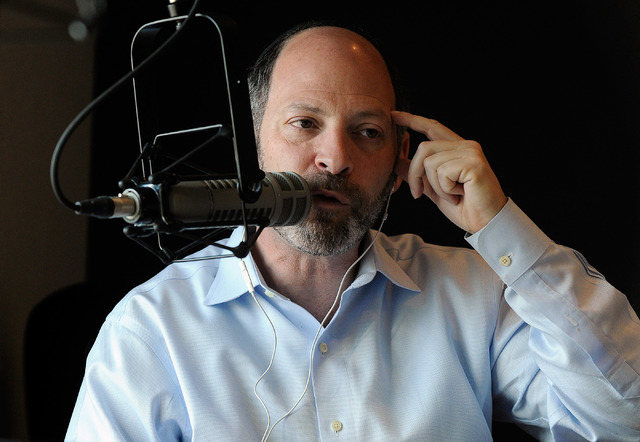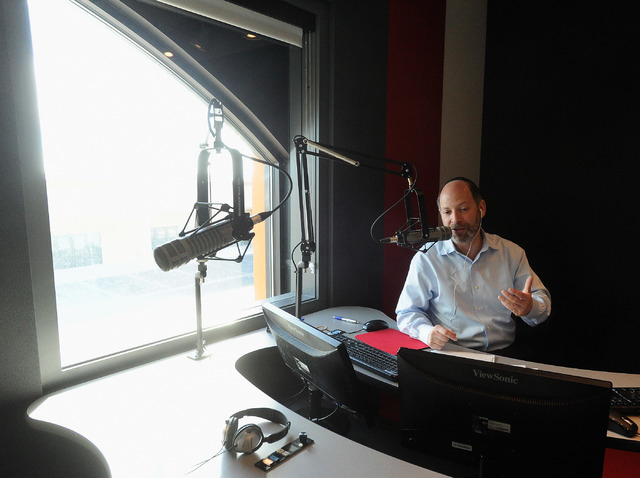Rabbi Wyne spreading God’s message his way
Before the next station break, you will learn this:
God rewards more than he punishes — about 500 times more, if you do the math. Prayer might have helped you win that Super Bowl bet (with an assist from the Seattle Seahawks). God talks to us through the Torah, but if you say he talks to you in your brain, we’ll lock you up.
Before you learn more, there’s that station break: a live commercial promoting a local Lasik eye surgeon. Want a discount? Mention “Rabbi-Vision.”
If it’s Torah, commercials and the bubbliest rabbi in town, it must be between 9 and 11 a.m. Sunday mornings on KDWN-AM 720, aka “The Rabbi Show.” Could also be 8:30 to 9 a.m. Sundays on KVCW-TV, Channel 33 (Cox Cable 6), aka “Life Is Great.” Subtract the commercials and it could be a 2011 book by the same name (Xlibris Corp., $9.99, $19.99, $29.99) or a series of “Torah for Living” YouTube videos (285,000-plus views and counting).
Credit all of them to Rabbi Yitzchak Wyne. Call him Yitz. He insists.
“It’s all to take universal values derived from Judaism and spread them out as far as possible,” says Wyne, 47, a married father of six (ages 9 to 22) whose many side gigs are secondary to his main job since 1995, as the orthodox spiritual leader of Young Israel Aish on West Sahara Avenue.
“To the nonreligious, completely unaffiliated Jew, I become their rabbi and it’s amazing,” he says. “I get emails every week — say, from the guy staying at The Orleans. He sees my show, he sends me a question. These are people who are not connected, but if Torah comes to them, they are inspired and inquisitive. Or I’ll go to the Coffee Bean &Tea Leaf and a black man will say to me: ‘You’re the rabbi. You send good messages to the young people.’ Hopefully, the non-Jew will respond in having a greater respect for the Jewish religion and the Jewish people.”
Judging by his demeanor, you’d think that each morning, Wyne guzzles a spiritual energy drink made from passion, enthusiasm and optimism. Like an irrepressible leprechaun in a yarmulke, he bounces into a Coffee Bean near the synagogue on a recent Monday afternoon to tape spontaneous interviews for his “Life Is Great” TV show. As forthright as any journalist (but cheerier) and trailed by cameraman David Taylor, he strides up to strangers.
“Hi, I’m Rabbi Wyne! Can I ask you a question on camera?” A couple, and a man and a woman all say yes immediately to this warm, disarming man. “Why do you think people pray?” he says. “What is the difference between when God answers yes and when God answers no? Is there anything we can do to persuade God to give a yes answer?” Typical of the exchanges is this one, with a man who has temporarily abandoned his caffeine to chat as the camera rolls:
“How often do you pray?”
“About 20 times a day.”
“Really? How often does God say yes?”
“All the time.”
“Really? And why do you pray?”
“It makes me feel closer to God.”
“Excellent!”
Occasionally, he says, his interview requests are rejected, but you can’t conceive of anyone willing to cause a look of disappointment on that boyish face.
“He’s a people person, that’s his thing, he reaches through the camera,” says Amy Henry, Young Israel’s executive director. “It’s not about stardom for him, but getting the message out and the values shared and letting people know that a lot of their religion’s values have their foundation in Judaism.”
Back at the synagogue, after the interviews are completed, Wyne, Henry and Taylor reconvene inside the sanctuary, where the rabbi tapes the talk — it’s too loosey-goosey to be called a lecture — into which the interviews will be edited.
“His message is so alive,” says Taylor as he sets up the camera. “And it’s very practical, not so esoteric and in the clouds. It’s: Do this, get that. The people he interviews are not always Jewish, and that’s the nice thing about Rabbi Wyne. He’s just going for everybody. I’m a Christian, but so many of the same things are in the message.”
Looking into the camera, it takes Wyne a few moments to rev up his Torah mojo. Acting as a kind of unofficial director/producer, Henry coaches him from a pew, as Wyne welcomes viewers he hopes will tune in the following Sunday.
“This is ‘Life Is Great,’ ” Wyne says.
“That sounds like, “Life Is … Eh,’” Henry quips.
“Like ‘Life Is Kinda Great’?” Wyne says.
“Like ‘Life Doesn’t Suck,’ ” she says.
Quickly, though, the rabbi is cookin’ on camera, asking and answering his own questions on behalf of his viewers:
“How do we speak to God? When I ask things of God, I’m speaking to him as I would another human being,” he says.
“Why do we have problems? Isn’t God an all-knowing, all-loving father? It’s to get our attention,” he insists.
“Why do we praise God? God doesn’t need our praise. It’s for us to recognize who we are speaking to,” he tells us.
The delivery is upbeat, chummy, relatable, genuinely felt. It’s pure Wyne.
Off-camera, it’s no different. “I’m not a maverick, but I’m unique in that the Almighty gave me a particular skill set that most rabbis don’t have,” he says, citing a non-Jewish woman who told him she had watched more than a hundred of his three-minute YouTube videos in marathon viewings over two days.
“She’s not part of us (the Jewish community), she’s not going to become part of us, but she can appreciate the values,” Wyne says. “It makes people’s lives better, and the world a better place, and that’s only what it’s about.”



